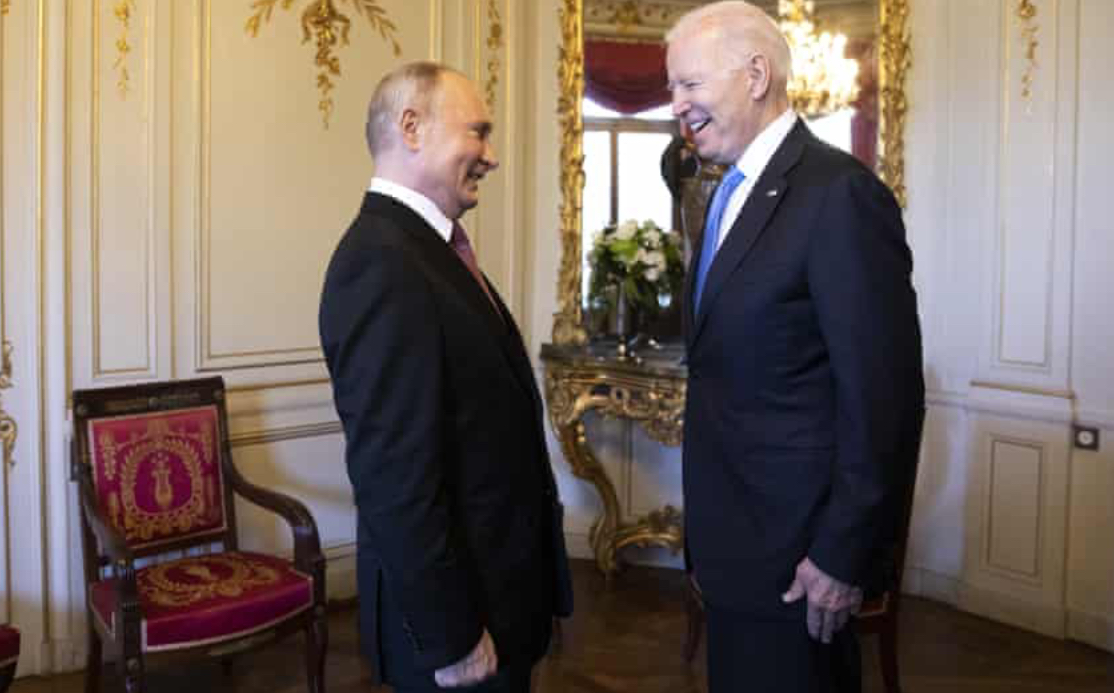1) The weird and unpredictable Trump era is over. In 2018 Donald Trump held a disastrous summit with Putin in the Finnish capital Helsinki. The then US president said he believed Putin’s assurances that Moscow did not interfere in the 2016 US election with a joint press conference that was so humiliating for America that Trump’s senior adviser Fiona Hill considered bringing it to a close by whacking a fire alarm or faking a medical emergency.
In Geneva, by contrast, cool normality was on display. Biden was well prepared for the US-Russia summit. He cut a relaxed figure, telling Putin he wanted a “predictable” relationship after a period defined by rogue Kremlin behaviour. The summit flowed along conventional diplomatic lines: a handshake, several hours of intensive talks and separate press conferences afterwards. The ghost of Helsinki was exorcised. There will be an agreed record of what was discussed, unlike in 2018 when Trump met Putin alone, without aides or even Trump’s own interpreter. We don’t know what was said.
2) Putin’s view of Washington is (still) negative. Over the last two decades he has met five serving American presidents. Throughout Putin has nursed a list of geopolitical grudges: Natoexpansion, alleged US meddling in Russia’s internal affairs, and its “hypocritical” behaviouras shown in Iraq and elsewhere. On Wednesday Putin hit back at claims Moscow was behind cyber-hacking, and suggested Russia wasn’t even on a list of nations responsible. He also complained about the “bloody coup” in Ukraine in 2014, which he believes the US instigated.
As in cold war times, Putin sees America as an adversary and global rival. The Geneva summit allowed Putin to present himself at home as Biden’s equal on the international stage. Despite modest progress at the talks, Putin is unlikely to yield to US pressure. He will continue to repress opponents and made clear he has no sympathy with the jailed opposition leader Alexei Navalny. Nor will he make concessions over Ukraine, a country intrinsic to Russia’s “great power” ideology and which Putin sees as his back yard. In recent years the Kremlin has waged a deniable almost-war against the west, featuring cyber-attacks, political interference and flamboyant state murder. Expect these wrecking tactics to continue.
3) The summit achieved some concrete results. Expectations ahead of Wednesday’s meeting were low given the poor state of bilateral relations. In the end, the obvious and easy “deliverables” were achieved. One was to normalise the situation of Russia and America’s ambassadors. The Russian ambassador to Washington was recalled after Biden described Putin as a “killer”. The US envoy to Moscow, John Sullivan, also went back in April to the US. Both will now return to their respective embassies, allowing diplomatic life to resume.
There will also be consultations between the US state department and the Russian foreign ministry on a range of issues including the Start III nuclear treaty, due to expire in 2024, and cybersecurity. Seemingly there was no progress in the cases of former marines Trevor Reed and Paul Whelan, both sentenced to long jail terms in Moscow on dubious charges. The Kremlin has offered to swap the two Americans for Konstantin Yaroshenko, a Russian pilot charged by the US with drug smuggling.
4) Putin is a master of deflection and “whataboutism”. At a post-talks press conference western correspondents wanted to know why young people in Russia were not allowed to demonstrate against the government. They also asked about the poisoning of Kremlin opponents. Putin responded by going off on long and irrelevant riffs. He said that 400 pro-Trump demonstrators who stormed the Capitol building in Washington on 6 January were merely expressing reasonable political demands. They were now being unfairly targeted and faced punitive jail terms, he suggested. Russia, he added, wanted to avoid similar disorder.
He also complained about the US Congress, which he said treated Russia as “an enemy”. The US was seeking to promote American “political objectives” by funding political groups inside Russia. The state was quite reasonably clamping down on them, he explained, since they were “agents” of a foreign power. None of this is really true. Putin is used to brushing off criticism and seems to relish the opportunity to do so. He also appears to like the BBC’s longtime correspondent in Moscow, Steve Rosenberg. Putin praised Rosenberg for his “artistry” when he asked whether Russia’s foreign policy could be “predictable”.
5) When it suits him Putin can turn up to big events on time. Russia’s president has a long history of keeping world leaders hanging around, in what appears to be deliberate one-upmanship. Ahead of the Geneva summit senior US officials drew up a protocol under which the Russian leader would arrive first. Their concern was well founded. In 2012 Putin kept President Obama waiting for 40 minutes at a G20 summit in Los Cabos, Mexico. Three years later he was an hour late for an audience with Pope Francis in the Vatican. He even kept the Queen hanging on for 14 minutes during a state visit to Britain in 2003. On this occasion, however, Putin behaved impeccably. He turned up at the Villa La Grange summit venue ahead of Biden, whose multi-vehicle convoy drew in a few minutes later.(The Guardian)





